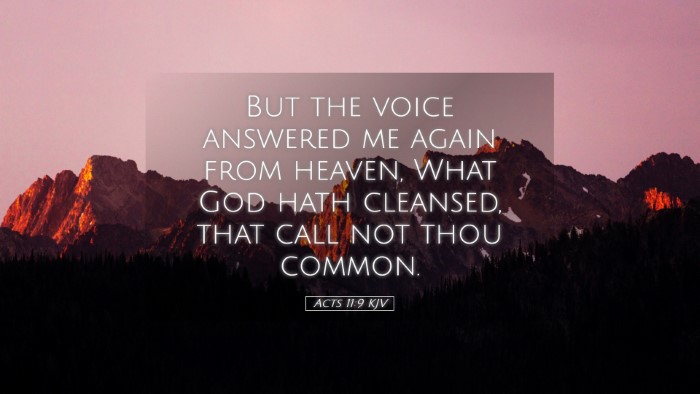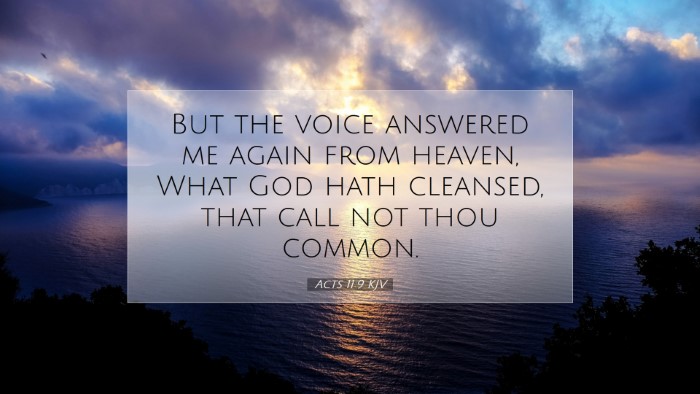Commentary on Acts 11:9
Verse Context: Acts 11:9 states, "But the voice answered me again from heaven, What God hath cleansed, that call not thou common."
This verse is pivotal in understanding the early Church's transition from Jewish customs to a more inclusive understanding of the Gospel. The context of the vision experienced by Peter (Acts 10:9-16) is crucial for a comprehensive examination, representing a significant theological shift regarding clean and unclean foods, as well as Gentile inclusion.
Insights from Public Domain Commentaries
Matthew Henry's Commentary
Matthew Henry emphasizes the divine authority behind the vision Peter experiences, stating that God's command supersedes human tradition. The term "clean" represents those whom God has accepted, and Henry suggests that God's power to cleanse extends beyond mere dietary laws. Henry notes:
- Divine Cleansing: God is the one who declares something clean. This is not just about food; it symbolizes the acceptance of Gentiles into the fold of the Church.
- Rejection of Prejudice: Henry points out that Peter's initial reluctance reflects the ingrained prejudices within Jewish culture. The vision calls for a radical change in perception, particularly concerning the Gentiles.
Albert Barnes' Commentary
Albert Barnes offers a detailed exploration of the implications of this verse. He notes:
- God's Sovereignty: "What God hath cleansed" indicates God's sovereign control over the process of cleansing, which is essential for understanding the nature of salvation as being initiated by God rather than human effort.
- Universal Grace: Barnes articulates the broadened scope of God's grace as the message of salvation is extended to Gentiles. This includes a theological underpinning that underscores God's desire for all peoples to be redeemed.
Adam Clarke's Commentary
Adam Clarke takes a systematic approach in his commentary, shedding light on the significance of the phrase "call not thou common." Clarke elaborates:
- Judicial and Ceremonial Laws: Clarke highlights the distinction between judicial and ceremonial laws of the Old Covenant, suggesting that while some laws may have been abrogated, God's moral law remains.
- The Role of Peter: Clarke acknowledges Peter's role as a pivotal figure in this transition, arguing that his vision illustrates the Church's mission—to break down barriers and preach to all nations.
Theological Significance
This verse, and the vision preceding it, signify a monumental shift in the early Church's understanding of God's plan for humanity. Themes emerging from the commentaries highlight the following:
- The Nature of God’s Grace: The concept of grace in this context is universal and transformative, extending to the very people whom Jews traditionally viewed as outsiders.
- Overcoming Cultural Barriers: The early Church was challenged to reassess long-held cultural and religious prejudices, a theme still relevant for contemporary believers as they engage in a diverse world.
- Call to Action: Peter's urgent call reflects a missional approach that insists on proactive sharing of the Gospel beyond familiar confines, demonstrating a pattern for modern evangelistic efforts.
Conclusion
Acts 11:9 encapsulates a critical moment within the narrative of the Church, emphasizing divine revelation that transcends human restrictions and prejudice. The collaborative insights from Matthew Henry, Albert Barnes, and Adam Clarke provide depth and clarity, making this passage particularly resonant for pastors, students, theologians, and Bible scholars alike. Each commentator compels us to reflect on our understanding of divine inclusion, grace, and the call to embrace a broader community of faith.


